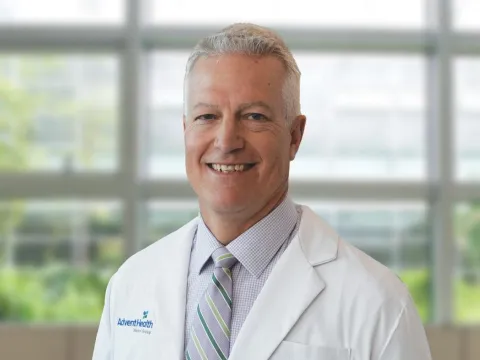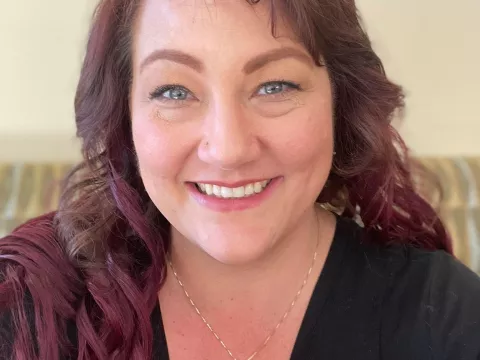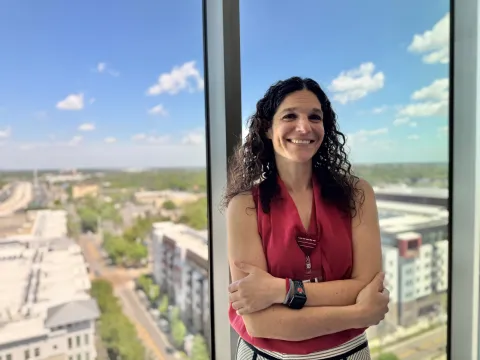- AdventHealth

Nearly one in five American adults live with mental illness.
This alarming stat was shared by Jennifer Wandersleben, CEO of Acute Care Services for AdventHealth’s Central Florida Division – South Region and chair of the Behavioral Health Steering Committee, during the health system’s 30th annual Conference on Mission. The virtual conference, held Sept. 18 and 19, was attended by AdventHealth Board members, executives, behavioral health experts and mission and ministry leaders, as well as Seventh-day Adventist Church leaders from across the country.
Conference on Mission is an AdventHealth tradition. An annual gathering to reflect and explore how the organization is living its mission of Extending the Healing Ministry of Christ. This year, the focus was on behavioral health.
“We are determining how we’re going to put behavioral health in the community in a way that, first, reduces stigma,” said AdventHealth President/CEO Terry Shaw in his opening remarks. “AdventHealth cares for about 6 million people a year and I am clear that there are so many unmet mental needs. So, the focus of this mission conference is how we can bring wholeness and peace of mind to our team members and to those we serve.”
On the first day of the conference, attendees watched a special presentation of the groundbreaking theatrical drama, The Manic Monologues, which brings real stories of mental illness to life.
However, attendees gathered not just to hear accounts of mental illness, but to discuss what actionable steps should be taken to address it.
“Each year, we approach Conference on Mission with the intent of focusing on the real needs of our patients and communities through the lens of our mission,” said Ted Hamilton, MD, chief mission integration officer for AdventHealth. “Our goal is to study, plan and operationalize our strategy in a manner that ministers in a practical way and that brings glory to God in the process.”
Following The Manic Monologues, two workgroups led by members of the Behavioral Health Steering Committee presented their progress on a behavioral health plan, one for primary care and the other for employees.
The primary care workgroup shared some additional alarming trends, one of which touched on suicide, which ended the life of an individual every 12 minutes in 2017. A previous study showed that 45 percent of those who died by suicide were found to have seen their primary care physician within 30 days.
As part of their presentation, the primary care workgroup outlined a three-point approach to behavioral health:
- Assessment: Embedding screenings into health care touchpoints
- Access: Improving access to provide prompt and effective behavioral health interventions
- Outcomes: Tracking outcomes to ensure patient improvement
In the end, the Collaborative Care Model (CoCM) was presented as a clinically proven way to integrate behavioral health into primary care in a way that addresses the three focus points.
On the employee side, leaders announced the launch of a new internal campaign, “Fine” is Not Fine, designed to increase awareness, improve access and address the stigma surrounding team members’ use of behavioral health resources.
Conference on Mission 2020 also included the traditional awards ceremony which honors individuals for their exemplary service. This year’s award recipients were:
Christian Service Award
- Wanda Escoffery, director of nursing for AdventHealth for Children
- Anna Coridan, RN at AdventHealth Shawnee Mission
Trustee of the Year Award
- Suresh Desai, MD, AdventHealth Daytona Beach
- Bill Jarrett, AdventHealth Sebring
Crystal Angel Award
- Bruce Christian, president/CEO for AMITA Health Adventist Medical Center GlenOaks and AMITA Health Adventist Medical Center Bolingbrook
- Mike Schultz, president/CEO for the West Florida Division
To close, Gary Thurber, president for the Mid-America Union Conference of Seventh-day Adventists, preached a Sabbath sermon that touched on his own sister’s struggles with alcoholism and mental illness. His message was based on 1 Corinthians 4:10: “Our dedication to Christ makes us look like fools…” (NLT). He ended by thanking AdventHealth for being “foolish” enough to confront behavioral health challenges, and other issues, even though it’s not financially rewarding – a hallmark of a non-profit, mission-driven organization.
“I’ve had more than one person tell me that I am not in the ‘right field’ of health care – that ‘there is no money in behavioral health,’” said Jennifer Lyons, director of behavioral health for AdventHealth. “We take a different approach… If your plans be with God, plan big.”
Recent News
Local leaders, officials, and construction workers gathered today to commemorate a major milestone in the expansion underway at AdventHealth Daytona Beach: placing the final steel beam.
Dr. Jeffrey Keen, a board-certified orthopedic surgeon specializing in adult reconstruction, orthopedic surgery, robotic-assisted surgery, and sports medicine, has returned to AdventHealth Medical...
In recognition of National Donate Life Month, nearly 300 transplant patients and their families enjoyed AdventHealth’s 2025 transplant reunion.
According to the National Kidney Foundation, more than 101,000 people are currently on the organ transplant list in need of a new kidney. However, only about 17,000 transplants happen each year —...
The AdventHealth Board of Directors has appointed David Banks as the organization’s new president/CEO, effective immediately.
In life, Sophie Davis touched dozens of hearts. In passing, one of her organs could possibly save thousands of lives.
As the days get longer and the weather warms up, people are eager to get back to their favorite outdoor spring activities and sports. This transition from winter to spring often leads to an increased...
Marie Williams remembers being admitted to AdventHealth Parker on September 1, 2023, for colon resection surgery, but after that, things get hazy.
AdventHealth for Children is a nationally recognized children’s hospital and comprehensive care network caring for nearly 200,000 children annually.
Care Management Assistant, Meghan Bussard, was the recipient of the 2024 Outstanding Team Member Award for AdventHealth Shawnee Mission. Bussard is known across AdventHealth Shawnee Mission as a...
As the only physician in Central Florida certified to use the intestinal ultrasound, a cutting-edge diagnostic tool still new to the U.S., Dr. Jennifer Seminerio-Diehl is transforming the way IBD is...
Every March, we celebrate Women’s History Month and the countless contributions women have made across all parts of society, including health care. One such area where women have made remarkable...












